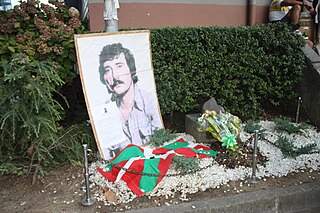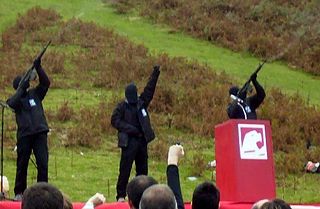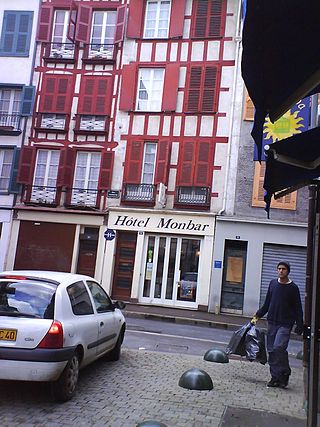Related Research Articles

GAL were death squads illegally established by officials of the Spanish government during the Basque conflict to fight against ETA, the principal Basque separatist militant group. They were active from 1983 to 1987 under Spanish Socialist Workers' Party (PSOE)-led governments.
The Batallón Vasco Español (BVE), sometimes associated with the Alianza Apostólica Anticomunista (AAA), Antiterrorismo ETA or Triple A, was a Spanish neo-fascist parapolice organization present mainly in the Basque Country and Southern France. It began operations in 1975, a year and a half after the murder of Luis Carrero Blanco by ETA and disbanded by April 1981. Some of its former members joined an organization formed not long after, known as the Grupos Antiterroristas de Liberación. The use of violence by the BVE was reported by ETA and its allies, who identified it as violence committed directly by the Spanish government against the Basque population. Manuel Fraga, former interior minister who was in office when the BVE was formed, defended it by saying it was a group of mayors who self-defended because ETA was going after them but had no influence in the course of the events.

Núria Espert Romero is a Spanish theatre and television actor, and theatre and opera director.

The Basque conflict, also known as the Spain–ETA conflict, was an armed and political conflict from 1959 to 2011 between Spain and the Basque National Liberation Movement, a group of social and political Basque organizations which sought independence from Spain and France. The movement was built around the separatist organization ETA, which had launched a campaign of attacks against Spanish administrations since 1959. ETA had been proscribed as a terrorist organization by the Spanish, British, French and American authorities at different moments. The conflict took place mostly on Spanish soil, although to a smaller degree it was also present in France, which was primarily used as a safe haven by ETA members. It was the longest running violent conflict in modern Western Europe. It has been sometimes referred to as "Europe's longest war".
The July 1979 Madrid bombings were a series of bomb attacks carried out by ETA political-military (ETA-pm), a faction of the armed Basque separatist group ETA. The attacks, consisting of coordinated bombings in Barajas Airport and the train stations of Atocha and Chamartín, killed 7 people and injured a further 100. The bombings occurred a day after two attacks in Bilbao and San Sebastian, with both attacks killing two people.

The Monbar Hotel attack was carried out by the Grupos Antiterroristas de Liberación (GAL), a Spanish state-sponsored death squad, on 25 September 1985 in Bayonne, Pyrénées-Atlantiques, France. The targets were four members of the Basque separatist terrorist group Euskadi Ta Askatasuna (ETA), whom the Spanish government believed to be senior figures in the organization, itself proscribed as a terrorist group in Spain and France. All four people were killed, with a fifth person, apparently unconnected to ETA, injured in the shooting. This represented the deadliest attack carried out by the GAL. Although two of the participants were apprehended shortly after the shooting, controversy surrounded the possible involvement of senior figures in the Spanish police.
The Grupos Armados Españoles (GAE) was a Spanish neo-fascist paramilitary organisation active from 1979 to 1980, primarily in the Basque Country. A report by the Office for Victims of Terrorism of the Basque Government in June 2010 attributed six murders to the group, and linked it to the National Police Corps, SECED and the Civil Guard.
The Alianza Apostólica Anticomunista was a Spanish far-right paramilitary organisation active from 1976 to 1983, primarily in the southern Basque Country but also in the French Basque Country and Barcelona. A June 2010 report by the Office for Victims of Terrorism of the Basque Government attributed eight murders with 66 deathly victims to the group and linked it to the National Police Corps, SECED and the Civil Guard. The group attacked the satirical magazine El Papus in Barcelona, killing one person and injuring 17.
Jesús María Pedrosa Urquiza was a Spanish politician who was a victim of terrorism of ETA.
José Antonio Vivó Undabarrena was a politician assassinated by the armed Basque separatist group ETA on February 6, 1979.
José Ignacio Ustarán Ramírez was a Spanish politician, candidate for UCD in the first elections for the Basque Parliament, and a mortal victim of the Basque separatist organization ETA on September 29, 1980.
José Luis Caso Cortines was a Spanish politician, a victim of ETA.
Juan de Dios Doval Mateo. He was a politician and professor at the Law Faculty of San Sebastian who was assassinated by the Basque separatist group ETA.
Luis Candendo Pérez was a Spanish politician victim of ETA's terrorism.
Luis María Uriarte Alzaa was a Spanish politician, Mayor of Vedia (Guipuzcoa) and Provincial Congressman in Biscay. The terrorist organization ETA murdered Luis María on September 29, 1979.
Manuel Zamarreño Villoria was a Spanish politician assassinated by Basque terrorist group ETA
Modesto Carriegas Pérez was a victim of the terrorism of ETA, candidate for the Congress of Deputies of the Coalition Unión Foral del País Vasco.
José Tomás Larrañaga Arenas was a Spanish politician who was assassinated by the ETA.
No te rías, que es peor is a Spanish game show broadcast from 1990 to 1995 on La 1 from 14:30 to 15:00 Monday to Friday. It was produced by Josep María Mainat and Toni Cruz.
María Jesús Alegre Etayo, also known as Chus Alegre, is a Spanish former rhythmic gymnast. She achieved, among other medals, the bronze in the general of the World Championship in Madrid in 1975, the first medal in an international competition for the Spanish national team and the only one in the individual All-Around of a World Championship to date. She won another three more medals in that World Cup and was also absolute champion of Spain in 1976 and 1977.
References
- ↑ Transición y represión política. Juan Manuel Olarieta Alberdi, Revista de Estudios Políticos, ISSN 0048-7694, Nº 70, 1990, pages 225-262
- 1 2 "Reportaje - Las otras víctimas". El País. 21 March 2010. Retrieved 25 August 2017.
- ↑ Las otras víctimas de una transición nada pacífica. Gonzalo Wilhelmi. Universidad Autónoma de Madrid.
- ↑ Digital, La Vanguardia. "Edición del domingo, 13 julio 1975, página 9 -Hemeroteca - Lavanguardia.es". hemeroteca.lavanguardia.com. Retrieved 25 August 2017.
- ↑ Digital, La Vanguardia. "Edición del martes, 07 octubre 1975, página 11 - Hemeroteca - Lavanguardia.es". hemeroteca.lavanguardia.com. Retrieved 25 August 2017.
- ↑ "ABC (Madrid) - 14/10/1975, p. 31 - ABC.es Hemeroteca". hemeroteca.abc.es. Retrieved 25 August 2017.
- ↑ "España: Indemnizarán a familia de víctima de la ultraderecha (El País / El Mundo, 16 - IV - 2002)". Archived from the original on 2007-10-20. Retrieved 2014-03-29.
- ↑ "Arturo Ruiz fue enterrado ayer reservadamente". El País. 25 January 1977. Retrieved 25 August 2017.
- ↑ "ABC SEVILLA (Sevilla) - 09/10/1977, p. 49 - ABC.es Hemeroteca". hemeroteca.abcdesevilla.es. Retrieved 25 August 2017.
- ↑ "Una organización de extrema derecha reivindica el asesinato de un taxista en Irún". El País. 30 May 1978. Retrieved 25 August 2017.
- ↑ "Asesinada la mujer del ex dirigente de ETA Juan José Etxabe". El País. 4 July 1978. Retrieved 25 August 2017.
- ↑ "Un muerto y dos heridos en el atentado contra EL PAIS". El País. 1 August 1981. Retrieved 25 August 2017.
- ↑ "ABC SEVILLA (Sevilla) - 27/06/1979, p. 25 - ABC.es Hemeroteca". hemeroteca.abcdesevilla.es. Retrieved 25 August 2017.
- ↑ March, Fundación Juan. "Artículo: Todos los nombres de la banda fascista del Retiro - Diario 16 - 22/09/1979 - Archivo Linz de la Transición española • Fundación Juan March". www.march.es. Retrieved 25 August 2017.
- ↑ Digital, La Vanguardia. "Edición del jueves, 10 enero 1980, página 22 - Hemeroteca - Lavanguardia.es". hemeroteca.lavanguardia.com. Retrieved 25 August 2017.
- ↑ "Violador condenado a veintisiete años de cárcel en Lugo". El País. 25 January 1980. Retrieved 25 August 2017.
- ↑ "ABC (Madrid) - 20/04/1980, p. 27 - ABC.es Hemeroteca". hemeroteca.abc.es. Retrieved 25 August 2017.
- ↑ "Tiempo de contar". Archived from the original on 2012-04-23. Retrieved 2014-03-29.
- ↑ "30º aniversario del asesinato de María José Bravo del Barrio . Noticias de Gipuzkoa". Archived from the original on 2013-04-11. Retrieved 2014-03-29.
- 1 2 3 4 Aizpeolea, Luis R. (21 March 2010). "Las otras víctimas". El País. Retrieved 10 January 2020.
- ↑ "La muerte de "Piti" - GARA". gara.naiz.info. Retrieved 25 August 2017.
- ↑ "5.000 personas en el funeral del gitano asesinado en Hernani". El País. 16 November 1980. Retrieved 25 August 2017.
- ↑ "Spain Sánchez 'attack plot': Police arrest gun suspect". bbc.com. Retrieved 2018-11-08.
- ↑ "Fire bomb attack on Spanish leftist party's office". reuters.com. Retrieved 2021-04-04.